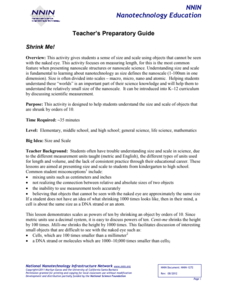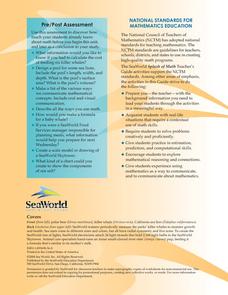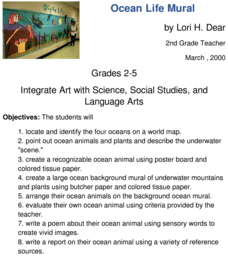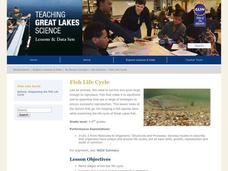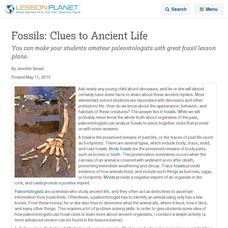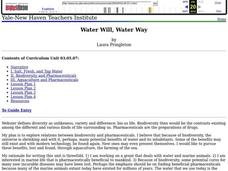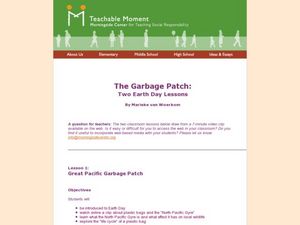Curated OER
Seed Dispersal
Students determine seed dispersal methods. In this life science instructional activity, students make predictions about how seeds might move, then look at seeds under micrographs or microscopes to analyze the seed coat and how this...
Curated OER
Introduction to Seed Germination
Students explore seed germination. In this life science lesson, students start seeds in Petri dishes, then observe which ones germinate and make predictions.
Curated OER
Lost Ladybugs
Students study ladybugs. In this life science lesson, students collect ladybugs from the schoolyard and explore their characteristics. Students illustrate pictures of ladybugs.
National Nanotechnology Infrastructure Network
Shrink Me!
The incredibly shrinking meter—decimeters to centimeters, to millimeters, and now to nanometers! Learners may have a difficult time visualizing particles on a nanoscale. Help them see a little clearer using a well-designed lesson that...
Sea World
Splash of Math
How can kids use math to learn about marine life? Combine math skills with science lessons in a resource featuring activities about life in the sea. Kids graph and calculate data, solve complex word problems, measure geometric shapes,...
Curated OER
Starfish Project: Ceramics
After exploring the wonders of ocean life found in tidal pools, explore ocean life through ceramic art. Kids use texturing and the pinch-and-pull technique to create starfish, just like the ones found at the seashore. Suggested...
Curated OER
The Very Hungry Caterpillar
Read the story, The Very Hungry Caterpillar, and complete activities from multiple subjects. Make a mural, create a class graph, discuss the life cycle of a butterfly, research information about butterflies on the Internet and make a...
Curated OER
Ocean Life Mural
How many oceans can you name? First, have learners try to name as many oceans as they can, and then have them locate and identify the oceans on a world map. They create a recognizable ocean animal using poster board and tissue paper....
Curated OER
The Impact of Fishing
Young scholars explore the concept of fishing as it relates to oceans and how some fishing practices can damage the health of the marine ecosystems. In this activity on the impact of fishing, students research the many places in the...
National Park Service
Living & Non-Living Interactions
What better way to learn about ecosystems than by getting outside and observing them first hand? Accompanying a field trip to a local park or outdoor space, this series of collaborative activities engages children in learning about the...
Polar Trec
Rings of Life
Individuals analyze tree rings to determine the health of an ecosystem. They then look at otoliths of fish, hard calcium carbonate structures located behind the brain, in the same manner.
Cornell University
Garden Math
Young scientists must put their math caps on and figure out what fraction of each flower is in a raised flower bed. They must problem solve to simplify the fractions, and then graph the amount of flowers that are in different flower beds.
US Mint
Desert Dwellers
What can a quarter possibly teach young learners about desert ecosystems? More than you might think. After displaying and discussing the included picture of the Arizona state quarter, the class participates in a series of shared reading...
Curated OER
Marine Animal and Plant Adaptations
Young scholars examine nature by creating their own animals. For this animal adaptation lesson, students define scientific vocabulary terms dealing with adaptation such as sea stars, sea cucumbers and exoskeleton. Young scholars utilize...
Michigan Sea Grant
Fish Life Cycle
Fish are no different when it comes to a living being's primary objective—to reproduce. They do differ, including from fish species to fish species, in their life cycles, survival tactics and reproductive strategies. After discussion of...
Education Outside
Nature's Treasure Map
Youngsters construct a map of treasures that they find along a nature trail as they hike. They also make sketches and create place names of some of the spots along the trail. Once back in class, pupils use their treasure maps to help...
Curated OER
What Does it Take to be a Survivor? Part One
Young scholars explore marine animal adaptation. In this introductory ocean life biology instructional activity, students access prior knowledge by participating in a whole class "thought swap." Young scholars form two lines, respond to...
Curated OER
Life in a Drop of Pond Water
Young scholars investigate living creatures that inhabit a pond and explore how various organisms satisfy their needs within their environments. In this life in a drop of pond water lesson, students examine microorganisms under...
Curated OER
Marine Life, Oceans, Lakes and Rivers
Students examine the types of organisms found in oceans. In groups, they read articles about the research done at certain sites. They work together to research their own water ecosystems and report the findings to the class. To end...
Curated OER
Fossils: Clues to Ancient Life
You can make your students amateur paleontologists with great fossil lesson plans.
Curated OER
Frontier Life Story
Students undertake a similar (but not quite as drastic) adventure as that of Frontier House as they explore the day-to-day realities of frontier life through a Laura Ingalls Wilder story, and reflect on which time period suits them...
Curated OER
Water Will, Water Way
Students test tap water for hardness and mineral content. In this environmental science lesson plan, students identify the different stages of the water cycle. They classify plant and animals according to the rules of taxonomy.
Curated OER
The Garbage Patch: Two Earth day Lessons
Students view a seven minute video called Gorilla in the Greenhouse. In this Earth day activity, students review the history of Earth day. Students work in groups to describe the life cycle of a plastic bag. Students understand that...
Curated OER
Freshwater Sharks Bite Children at 35th Beach. A Play
Students delve into a study of sharks. In this science lesson plan, students examine the many different scientific occupations, as well as some possible specializations therein, and perhaps a little bit of other life considerations,...





